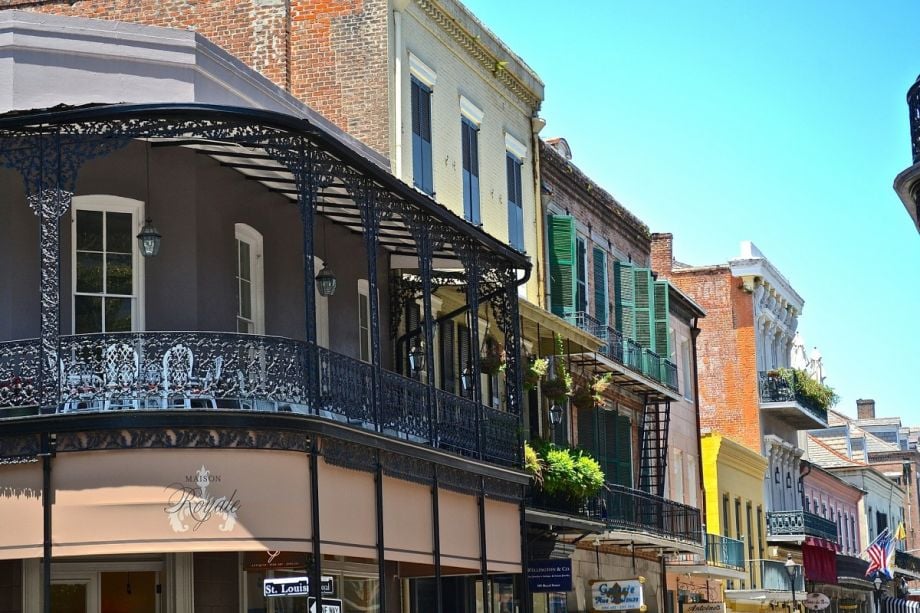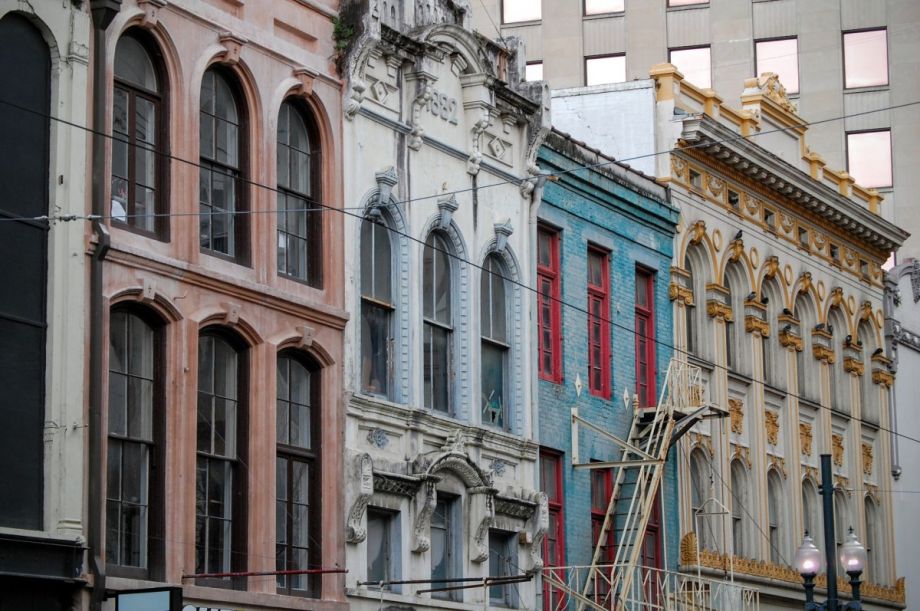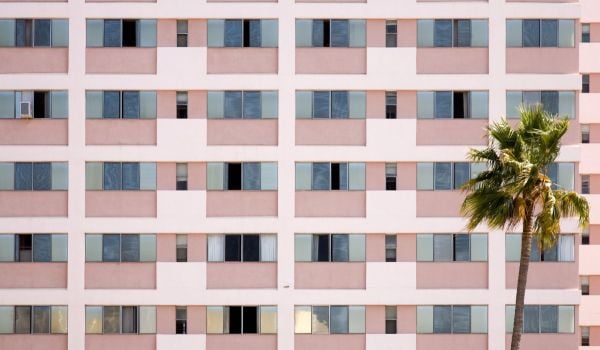The city of New Orleans, after a long and heated debate, voted to legalize short-term rentals on platforms like Airbnb one year ago. Most affordable housing advocates viewed the new ordinance as overly generous to those in favor of short-term rentals; short-term rental proponents wished it was more lenient. New data on the impact of the ordinance on New Orleans, and approaches to regulating the business model by other municipal governments provide a sketch of how short-term rentals can affect a city, but the picture is still far from clear.
With new regulations effective in April, the city of New Orleans started offering two types of permits in residential areas. The holder of an accessory permit can offer rentals for as many nights a year as they want, in rooms within homes where the owner also lives (and includes the other half of an owner-occupied double shotgun). The accessory permit is $200.
A temporary permit, which costs $150, allows a person to rent out an entire home, for up to 90 days per year. There’s no limit on how many temporary permits one person (or company) can obtain. Owners do not need to live on the premises.
Properties in areas zoned commercial aren’t subject to the 90-day cap and don’t have to be owner-occupied. There is, however, an outright ban on short-term rentals in most of the French Quarter, the city’s main tourist destination.
Breonne DeDecker runs the affordable housing nonprofit Jane Place Neighborhood Sustainability Initiative (JPNSI), which creates permanently affordable housing through a community land trust in New Orleans’ Mid-City neighborhood. DeDecker knows that companies like Airbnb have come under scrutiny for lots of reasons: Houses that rent out to bachelor parties and other large groups create noise and garbage, and the platform’s users have been accused of racial profiling. But DeDecker is focused on the affordable housing challenge that short-term rentals present, and she’s issued a series of reports and data analyzing the effects of such rentals throughout the city, one of which was released in September.Amid its growing popularity over the last several years, Airbnb has touted that hosts across the world earn helpful supplementary income on its platform. But affordable housing advocates have charged that short-term stays in cities take homes off the market that would otherwise be long-term rentals for residents. In turn, they say, this more limited supply drives up rents.
From an affordable housing perspective, there are two regulations that really matter: whether the owner is required to live on the property, and the number of nights per year a rental can be available. If an entire home can only be rented nightly a few dozen times a year, the owner would likely still live in that home, or rent it out to a tenant long term. So a cap on rental nights could meet the needs of a family who might want to rent out their place while they’re away on vacation — say, to get out of town during Jazz Fest in New Orleans. But if short-term rental operators are allowed to rent for enough nights out of the year that it becomes worth it for real estate investors — many who may not live locally — to buy units with the express purpose of renting them short term, then those units are essentially removed from the available housing stock for long-term renters.
DeDecker estimates that with the 90 nights-per-year limit in New Orleans’ ordinance, it’s still worthwhile for many investors to purchase and use homes exclusively for short-term rentals; they could still rent their units most weekends out of the year.
“You still make more money short-terming than you do on a long-term tenant,” she says.
Plus, DeDecker says, there are loopholes in New Orleans. While rental operators must file for a permit with the city, rental hosting platforms don’t require such paperwork. A single operator could easily list a unit on Airbnb for 90 nights out of the year and on a competitor like VRBO for 90 additional nights. Hosts who want to skirt the ordinance could rent under the radar until a neighbor files a complaint or the city hunts them down. The data-sharing agreement that New Orleans struck with the private companies is anonymous, so it’s very difficult to match the listings across platforms and enforce violations on the temporary permit holders. When the city does believe it has found a bad actor, officials must request a subpoena, a process that takes up to a month.
Researcher Jeffrey Goodman has looked into short-term rental ordinances across the U.S. He says when it comes to city regulation, there are typically three waves. First, there’s the original ordinance on the books, usually from the 1950s, that doesn’t work to accommodate any short-term rental arrangement, because it doesn’t include any enforcement mechanism. Next, cities usually try to work with the rental platforms.
“They were like ‘we’re hip, we’re cool,’” says Goodman of what he has observed of city governments’ attitude toward working with the companies in recent years. “And they worked with these companies not realizing that it’s regulatory capture. Not realizing that having the companies have a lot of influence in writing their own ordinance led to bad outcomes, and a lot of cities felt played.”
The third wave, according to Goodman, is currently unfolding in places like Anaheim and San Francisco, with cities requiring more of the companies and the latter responding with litigation.
Goodman says those cities are at least starting to regulate short-term rental service so it functions the way the companies claim they’re designed to: as an extra income generator for homeowners. But Goodman says that by not requiring that owners live on their property, and by keeping data private, that’s not what New Orleans has done.
“The people who can take advantage of this market are not the people who need the money,” he says.

The French Quarter in New Orleans has different rules about short-term rentals than the rest of the city.
“There’s sort of an industry that has sprung up around the regulation of short-term rentals and they built either computer or human resources to match all those things up,” he says. Jen Cecil, Director of One Stop for Permits and Licenses with the city, says an RFP for these services would likely be released later this year.
And while Goodman says that New Orleans is a whole wave behind other cities with more stringent regulations, Munster says cities across the world are modeling their deals off of New Orleans’ approach.
“We’ve got the most successful program in the country. Our compliance rate is in the high 90 percent range. We got this deal put in place last year in December,” he says. “Shortly thereafter, San Francisco settled their suit with these platforms with basically this exact same agreement in place.”
Goodman points to a key difference in the agreements: San Francisco prohibits platforms from listing unpermitted properties. Still, Munster says, New Orleans has had more applications than they projected.
“We’re fairly confident that everyone who’s trying to do this is trying to do this legally,” Munster says.
According to DeDecker’s data, as of June, there were 5,307 Airbnb listings in New Orleans, 3,156 of which were legally permitted. (Editor’s Note: Erin Burns, the mayor’s press secretary, notes in an email that DeDecker’s data does not take into account the hotels, motels and bed-and-breakfasts that are legally permitted as something other than short-term rentals, but are also still able to list their rooms individually on the rental platforms. This, in part, explains why the number of listings would be greater than the number of short-term rental permits on file.)
Even within the rule of the law, the proliferation of short-term rentals can have adverse effects. DeDecker’s report highlights a particular block in New Orleans’ Seventh Ward where eight permits legally allow for at least 20 rooms to be licensed per night. Around 40 tourists could be staying on that one residential block on the same night. Goodman calls these “dark blocks” and says they are possible because there are no limits on the number of short-term rentals per block.
DeDecker also calls out companies like Stay Alfred, which manages short-term rental listings in cities across the U.S. The Spokane, Washington-headquartered Stay Alfred has 142 listings on Airbnb in New Orleans.
“They are basically running a disaggregated hotel that is taking rental units off the market,” says DeDecker. (A spokesperson for Stay Alfred says, “Since our inception, we’ve always supported short-term rental legislation that provides a clear licensing path. It’s good for us and the communities we are a part of.)
Thanks to the limitations for the French Quarter that the New Orleans ordinance put into effect, that neighborhood is now offering a glimpse of what a ban on short-term rentals looks like. As regulation was being debated, residents there voiced concerns about the potential for their neighborhood to turn into a ghost town. The city responded with the outright ban in the French Quarter (that excludes one commercially zoned strip along Bourbon Street).
Meg Lousteau, executive director of the Vieux Carré Property Owners and Residents Association, or VCPORA, says since the ban, she has seen the number of units available for long-term renters and buyers alike increase.
“That could be happening in other neighborhoods,” she says. “We could be having hundreds of units returned to the market like we are in the French Quarter.”
Beyond eating up the housing stock for renters, Goodman points to another affordable housing issue exacerbated by short-term rentals: “It’s not just your normal bachelor party problems, but tax assessors taking into account the fact that you can do short-term rentals in [assessing] your property value.”
Because short-term rentals are priced to appeal to the tourist’s buying power, not that of a local, they can inflate the housing market. DeDecker found that on Airbnb, the average price per whole house rental per night was $229 — very competitive with hotels, and therefore attractive to tourists. On the other hand, a landlord could only get about $45 a night for the same home if they rented to a long-term tenant. DeDecker says she has noticed more and more for-sale listings boast about the property’s ability to generate short-term rental income, which factors into the sale price. This causes the value of those homes to rise, even though that rise does not reflect the buying power of the neighborhood’s residents.“They never have to lower costs to meet the market for a neighborhood, so it permanently inflates prices,” DeDecker says.
Affordability is highly relevant in New Orleans. Over half the city’s residents are renters, and 61 percent of them pay more than 30 percent of their income on rent — the standard at which renters are considered rent-burdened. More than one-third of renters pay more than half of their income in rent. On top of that, the rental stock is low: Seventy-eight percent of rental units are classified as substandard housing, and the citywide vacancy rate for rental housing is below 8 percent.
Conversely, many argue that short-term rentals contribute to the tourist economy in New Orleans, which is the largest industry in town and employs over 80,000 people. The Alliance for Neighborhood Prosperity, a New Orleans-based short-term rental advocacy group, maintains that the popularity of services like Airbnb in the city demonstrates a demand for more accommodations for tourists, who in turn contribute to the economy. A 2013 study prepared for the group by the University of New Orleans found that approximately 100,000 visitors to the New Orleans area stayed in short-term rentals that year. They estimated these visitors generated a total economic impact of $174.8 million. The study found that visitor spending also resulted in the creation or support of nearly 2,200 full-time and part-time jobs.
Jobs for jobs’ sakes aren’t enough in DeDecker’s opinion. It is true that even absentee landlords need to hire property management companies and maintenance staff to manage their units. And more visitors mean more business for restaurants, musicians and bars. But DeDecker says she doesn’t think that’s the right calculus.
“The bump in wages doesn’t keep up with housing inflation,” she says. “I think it’s more important to look at what point are New Orleanians not going to be able to afford to live here.”
Editor’s Note: This article has been changed to show the correct permit prices, and what types of rentals an accessory permit covers.

Nina Feldman is an independent journalist focused on audio production. She worked as a regular contributor to NPR member station WWNO in New Orleans and as editor at American Routes. Her work has also appeared on Marketplace, Morning Edition and PRI's The World.
















